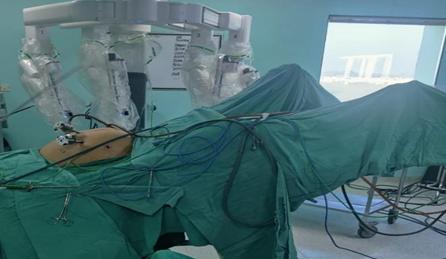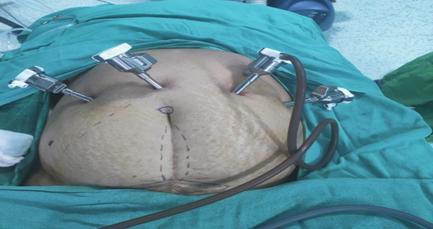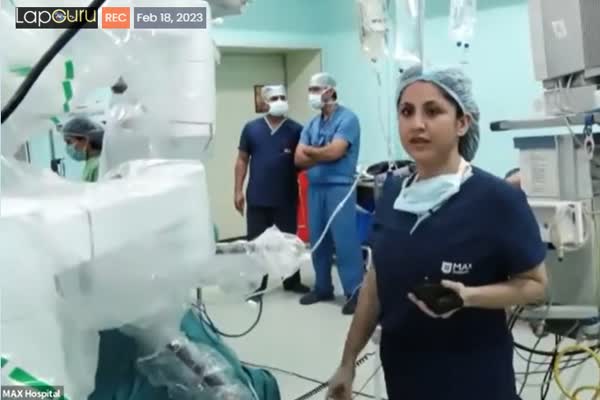Robotic Hysterectomy for Endometrial Malignancy
Education event Sponsored by: Intuitive Surgical
Conference Name: LIVE Operative Workshops by Intuitive
Conducted by: Intuitive Surgical India Pvt Ltd
Surgeon(s)/Speaker(s): Dr. Harit Chaturvedi and Dr. Kanika Batra Modi
Surgical Procedure: Oncology-Robotic Malignant Hysterectomy
Location: Max Super Specialty Hospital, Saket New Delhi
Indexsteps
1. Pan surveillance of abdomen : Pan surveillance of abdomen done and findings to be noted
2. Peritoneal fluid for cytology to be taken :
3. Clipping Infundibulopelvic ligament : Peritoneal incision given over lateral pelvic wall, ureter identified and IP ligament clipped.
4. Peritoneal incision extended till round ligament : Peritoneal incision extended till round ligament and landmarks ( medial obliterated umbilical ligament , ureter, iliac vessel ) identified.
5. Identifying sentinel lymph nodes : Identifying sentinel lymph nodes on firefly mode and dissected.
6. Peritoneal incision extended : Peritoneal incision extended till vesicouterine pouch bilaterally and bladder dissected off the lower uterine segment and cervix.
7. Bilateral uterine arteries bipoled and divided :
8. Bilateral uterosacral ligament coagulated and uterine attachment divided. :
9. Circumferential colopotomy done and cervix separated from vagina :
10. Bilateral IP ligament coagulated and divided :
11. Uterus delivered vaginally :
12. Vault closed in continuous fashion :
13. Hemostasis and mops count checked and abdomen desufflated :
14. Ports closed :
port positions
1. Patient position : • Dorsal supine lithotomy position
• After primary port placement steep Trendelenberg position.

2. Port Position : ● Creating pneumoperitoneum via veree’s needle from Palmer’s point
● Supra-umbilical 8mm camera port
● Working Ports: Three. 8 mm ports – two on left side and one on right side of abdomen all atleast 8 cm apart from each other in same transverse line as primary camera port
● Accessory assistant port 12 mm – right iliac fossa

precautionary_measures
1. Postoperative care : ● Careful closure of ports ● Infiltration of all trocar sites with local anesthetic ● Closure of wounds and application of dressing
pre_post_measures
1. Preoperative investigations : Complete blood count :new:Blood sugar – random (fasting and postprandial, if diabetic) :new:Serum creatinine :new:Liver function tests :new:Coagulation profile :new:HIV / HbsAg / Anti-HCV :new:Blood group :new:Chest x-ray :new:ECG :new:Echocardiogram (if over 50 years) :new:PET CT SCAN WHOLE BODY/ CE-MRI WHOLE ABDOMEN + NCCT CHEST
2. Preoperative measures : General Anaesthesia :new:Patient is catheterized to empty the Bladder. :new:Attachment of the diathermy plate :new:Securing the patient to the table :new:Padding of the pressure points :new:Dose of prophylactic antibiotic at the time of induction of anaesthesia :new:Anti-embolic stockings / placement of an intermittent compression device on the legs
3. Postoperative measures : NBM for 8 hours :new:Ambulate after that :new:Analgesics as required :new:Input output charting :new:Thromboprophylaxis
Surgical Instruments
1. Da Vinci Xi Surgical System
2. Prograsp Forceps
3. Monopolar Scissors
4. Needle drivers
5. Bipolar forceps


